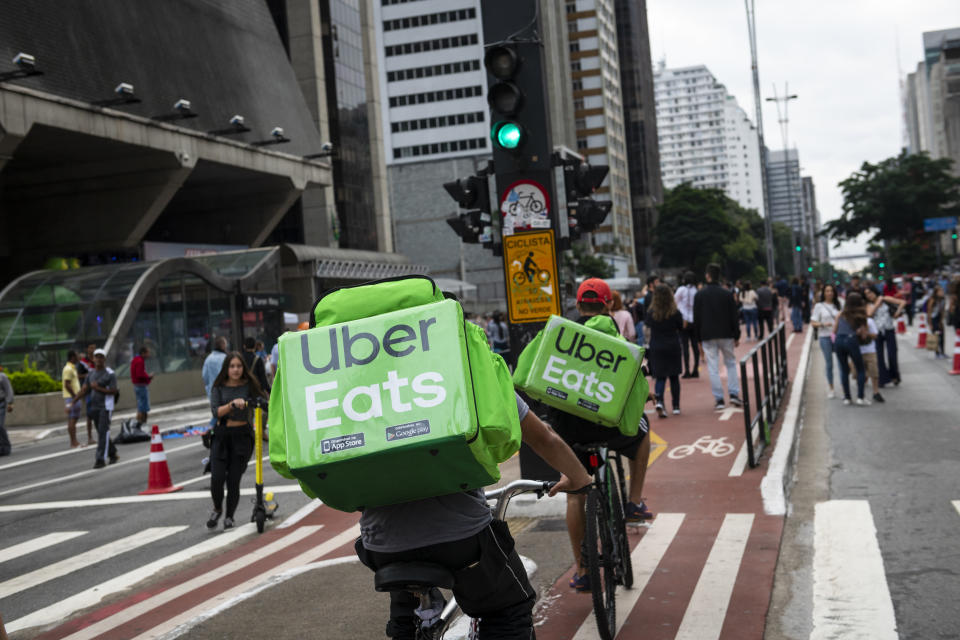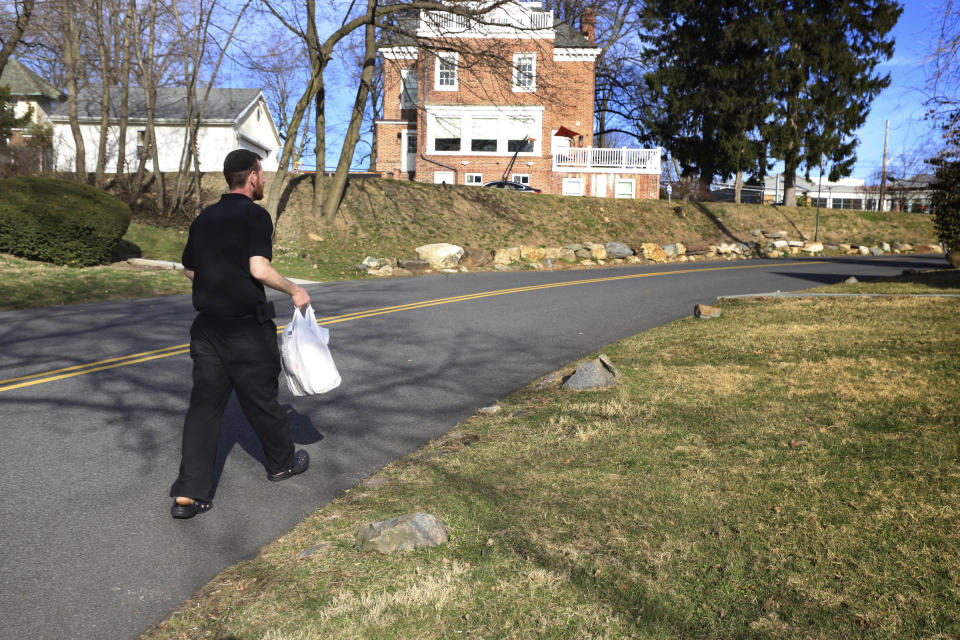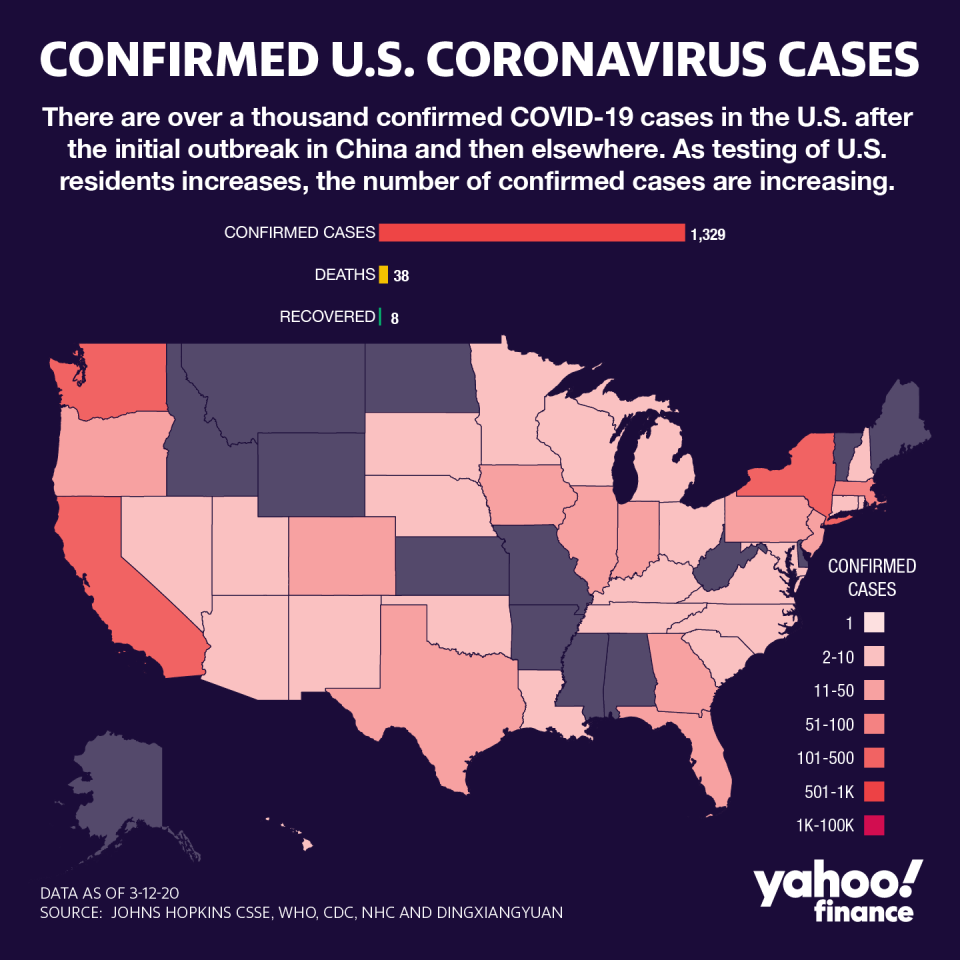How the coronavirus outbreak is affecting your online food delivery
The spread of the coronavirus and sweeping policy measures to combat it have led to a spike in online food delivery. As consumers globally have been either mandated to stay home or voluntarily chosen to do so, many have been ordering in.
According to new UBS research, demand for online delivery has risen in most markets impacted by the coronavirus outbreak. Demand for Food Panda, Delivery Hero’s brand in Asia, has shot up 80% during the New Year holiday in Hong Kong. Yogiyo, which is Delivery Hero’s brand in South Korea, has seen a weekly 3% to 4% increase in deliveries since Jan. 20. Singapore’s food delivery business saw a similar upward trend. Grab orders rose 20% in early March.
Uber (UBER) CEO Dara Khosrowshahi believes that Uber’s food delivery business will grow during the coronavirus outbreak. “Certainly our rides business to the extent that people stop leaving their house will take a hit, while our business Eats will probably actually benefit,” he said last week at the Morgan Stanley 2020 Technology, Media & Telecom Conference in San Francisco.
Grubhub (GRUB) CEO Matt Maloney expressed some reservations about the benefit of the coronavirus outbreak on the company's bottom line. “We’ll see. I have no idea. Coronavirus is a scary situation,” he said.

Risks to booming meal delivery business
The increase in meal delivery demand may be short-lived, however. After spiking initially in China, online meal orders fell, according to UBS. Increased consumer concerns about being delivered contaminated meals led to a slowdown in orders, and a rise in online grocery delivery. Many Chinese consumers are increasingly opting to cook instead.
China’s rate of infection has decreased from hundreds a day to fewer than 50 this week, but the number of deaths has surpassed 3,000. UBS expects this consumer online food delivery evolution from prepared meals to groceries will develop similarly in new markets exposed to the coronavirus.

Supply disruptions caused by the coronavirus outbreak are a threat to the food delivery business. UBS points out that the temporary closure of 30% of Yum China (YUMC) restaurants during the Chinese New Year holiday negatively impacted the food delivery business. Italy’s food delivery companies are also at risk, according to UBS. While search trends for online delivery spiked in Italy, the nationwide quarantine and closure of restaurants could impact the volume of food supplies and in turn end up hurting online food delivery.
In the U.S., if more people are quarantined that could lead to a scarcity of drivers. The combination of fewer drivers and forced restaurant closures would negatively impact supply for the food delivery business.
“Delivery drivers typically work on a gig economy model and there is no obligation to show up. This could be problematic as drivers might become concerned with contact with users being placed on quarantine,” writes UBS analyst Hubert Jeaneau.
Recently health concerns have prompted U.S. food companies to alter their sick leave policies. McDonald’s is offering quarantined workers 14 days of sick pay. This new policy, though, only applies to workers at its corporate-owned locations, representing 5% of its overall restaurants. Darden Restaurants (DRI), which counts Olive Garden as one of its top brands, recently announced their hourly workers would be getting 40 hours of sick pay per year. Uber and Lyft have made emergency funds available for drivers who are quarantined or test positive for coronavirus.

Consumers’ concern about their financial wellbeing could be yet another contributing factor to a slowdown in food delivery demand. UBS analysts said those who fear a wider economic impact from income or job loss may engage in “precautionary savings.” Nevertheless, the online food delivery business would still fare better than the restaurant dining-out business during the coronavirus outbreak.
Food delivery incentives in time of coronavirus
Companies have taken steps to try to reassure consumers who fear that a sick worker might be preparing their food. Many are also working to mitigate concerns that an infected driver might be delivering meals. Postmates, for instance, gives U.S. users the option to have their meals dropped off at their door so that they have no contact whatsoever with the driver, or instead get the delivery handed to them outside so that the driver does not stand at the entrance to their home. Instacart allows users to opt for groceries to be left at their door to avoid physical contact.
In China, companies are offering consumers physical cards which contain information on the body temperatures of cooks and other workers involved in the delivery service. Consumers are also told about the disinfection of courier equipment, according to UBS. We’ll see if it will come to that, here in America.
More from Sibile:
Coronavirus threatens the jobs of these 15 million US workers
Private plane travel demand rises amid coronavirus outbreak
Modell’s CEO: Without tariffs, ‘economy would have been a disaster’
Tapestry CEO Jide Zeitlin talks diversity: ‘Talent comes in many forms’
How a publishing company started by a former slave has lasted for 120 years
